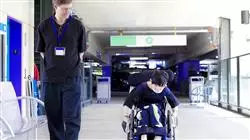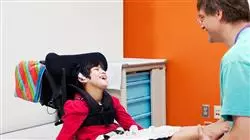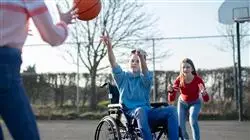University certificate
The world's largest faculty of education”
Introduction to the Program
Identify the main educational intervention techniques according to the developmental stages for each student"

Motor skills are an important aspect of education, since they allow the students to perform activities such as dance, sports and writing, techniques used for learning general areas of knowledge. However, when suffering from a disease that affects the Locomotor System, it is necessary to implement new models that allow to demonstrate the progress and development of each student, so methodologies focused on the use of the voice would be more fruitful.
Due to this, the teachers have to update their knowledge according to new academic advances and new practices in the classroom. This will provide them with new competencies that will improve and expand their vision of education. For this reason, TECH has designed this 100% online program in order for the teaching professionals to adopt assessment and intervention strategies in Nervous System Disorders.
All this, presented in a syllabus full of high-impact audiovisual material, complementary and informative readings and practical exercises based on real cases. Also, the program has the facility to be developed remotely, regardless of place or time and only need a device with an Internet connection. In addition, you will be able to download the content of the program to review it as many times as necessary and even have it at hand once you have completed your qualification.
Apply the most distinguished techniques in the field of education according to Musculoskeletal Disorders"
This Postgraduate certificate in Motor Disorders, Musculoskeletal and Nervous System Diseases contains the most complete and up-to-date educational program on the market. The most important features include:
- Practical cases presented by experts in Motor Disorders, Musculoskeletal and Nervous System Diseases
- The graphic, schematic, and practical contents with which they are created, provide practical information on the disciplines that are essential for professional practice
- Practical exercises where self-assessment can be used to improve learning
- Its special emphasis on innovative methodologies
- Theoretical lessons, questions to the expert, debate forums on controversial topics, and individual reflection assignments
- Content that is accessible from any fixed or portable device with an Internet connection
You will have access to the Virtual Campus 24 hours a day, so you will be able to go deeper into the syllabus and improve in those aspects that are difficult for you”
The program includes in its teaching staff professionals from the sector who pour into this training the experience of their work, in addition to recognized specialists from reference societies and prestigious universities.
Its multimedia content, developed with the latest educational technology, will provide the professionals with situated and contextual learning, i.e., a simulated environment that will provide an immersive education programmed to learn in real situations.
The design of this program focuses on Problem-Based Learning, by means of which the professionals must try to solve the different professional practice situations that are presented throughout the academic course. For this purpose, the students will be assisted by an innovative interactive video system created by renowned experts.
It is a Postgraduate certificate designed by the best minds in the industry, who hope to contribute significantly to your profession"

TECH offers you an innovative and high-impact program, tailored to your needs to achieve your professional goals"
Syllabus
The syllabus of this program was designed to delve in depth into the Locomotor System Diseases and those that affect the Central Nervous System. This, in order for students to achieve an academic update of their current knowledge according to the future needs of the field. Therefore, this Postgraduate certificate contains one of the best educational syllabus, full of audiovisual material, complementary readings and practical exercises carried out in real cases.

You will be able to access the study material as many times as you want, you will only need a device with an Internet connection"
Module 1. Neurodevelopmental Disorders: Motor Disorders/Musculoskeletal Disorders/Nervous System Diseases
1.1. Concept and Definition of Motor Disorders/Diseases of the Musculoskeletal and Connective System
1.1.1. Definition of the Locomotor System
1.1.2. Functions of the Locomotor System according to
1.1.3. Importance of the Locomotor System
1.1.4. Development of the Locomotor System according to
1.1.5. Referred Disorders of the Locomotor System
1.1.6. Definition of the Musculoskeletal System
1.1.7. Functions of the Musculoskeletal System
1.1.8. Importance of the Musculoskeletal System
1.1.9. Development of the Musculoskeletal System
1.1.10. Disorders of the Muculoskeletal System
1.1.11. Definition of the Connective System
1.1.12. Functions of the Connective System
1.1.13. Importance of the Connective System
1.1.14. Development of the Connective System
1.1.15. Disorders of the Connective System
1.2. Classification of Motor Disorders/ Musculoskeletal System and Connective System Diseases
1.2.1. Relationship between DSM V and ICD-10 Classifications between Motor Disorders and Skeletal System and Connective System Disorders
1.2.2. DSM V Classification
1.2.3. Disorders Not Included in the DSM V
1.2.4. ICD 10 Classification
1.2.5. Disorders Not Included in the ICD 10
1.2.6. The Need for Consensus between Both Classifications
1.2.7. Common Disorders in DSM V and ICD 10
1.2.8. Differences in Classification between DSM V and ICD 10
1.2.9. Contributions of the Differences between DSM V and ICD-10 Classifications to the Work of the Teacher Specialized in Therapeutic Pedagogy for Teachers.
1.2.10. Common Contributions of DSM V and ICD-10 Classifications to the Work of the Teacher Specialist in Therapeutic Pedagogy
1.3. Incidences in Developmental Stages
1.3.1. Definition and Concept of Motor Developmental Stages
1.3.2. Definition and Concept of the Musculoskeletal and Connective Systems Developmental Stages
1.3.3. The Need to Unify the Stages
1.3.4. Milestones in Development
1.3.5. Embryo and Fetus Incidents: Consequences
1.3.6. Incidents During the First Year of Life Consequences
1.3.7. Proximate-Distal Law Incidents: Consequences
1.3.8. Cephalocaudal Law Incidents: Consequences
1.3.9. Gait Incidents: Consequences
1.3.10. Other Incidents
1.4. Multiprofessional Coordination
1.4.1. Definition of Multiprofessional Coordination
1.4.2. The Need for Multiprofessional Coordination
1.4.3. Family as the Core of Multiprofessional Coordination
1.4.4. Diagnosing Disorders
1.4.5. Education Center Professionals: Coordination
1.4.6. Physiotherapist Intervention in and out of School
1.4.7. Orthoprosthetist Intervention in and out of School
1.4.8. Education Center External Professionals: Coordination
1.4.9. Coordination between Internal and External Professionals
1.4.10. The Teacher Specialist in Therapeutic Pedagogy as a Liaison between Professionals
1.5. Documentation and Organization According to Student Needs
1.5.1. Disorder Diagnosis Documentation
1.5.2. Disorder Revisions and Follow-up
1.5.3. Physiotherapist Documentation
1.5.4. Disorder Revisions and Follow-up by Physiotherapists
1.5.5. Orthotist Documentation
1.5.6. Disorder Revisions and Follow-up by Orthotists
1.5.7. School Documentation
1.5.8. Psychopedagogic Evaluation to Determine Student Needs in the Classroom
1.5.9. Elaborating Individual Curricular Adaptation Documents
1.5.10. Individual Curricular Adaptation Document Follow-up
1.6. Educational Intervention According to Developmental Stage
1.6.1. Developmental Milestones for Educational Intervention
1.6.2. Diagnosis. Early Stimulation
1.6.3. Educational Intervention to Promote Cephalic Support
1.6.4. Educational Intervention to Promote Torso Support
1.6.5. Educational Intervention to Promote Support to Stand Upright
1.6.6. Educational Intervention to Promote Proximal-Distal Law
1.6.7. Educational Intervention to Promote Cephalic-Caudal Law
1.6.8. Educational Intervention to Promote Gait
1.6.9. Educational Intervention to Improve Hypotonia
1.6.10. Educational Intervention to Improve Hypotonia
1.7. Adapted Individual Tools and Supplies
1.7.1. Concept of School Activities
1.7.2. The Need for Preliminary Activities for Special Educational Needs Students
1.7.3. The Need for Final Activities for Special Educational Needs Students
1.7.4. Classroom Adaptation
1.7.5. School Adaptation
1.7.6. Tabletop Supplies
1.7.7. School Ambulation Supplies
1.7.8. School Recess Supplies
1.7.9. Food and Cleaning Supplies at School
1.7.10. Other Materials
1.8. Adapted Collective Tools and Supplies
1.8.1. Concept of Collective Tools and Supplies: The Need to Include Students
1.8.2. Tools and Supplies Classification According to the Setting
1.8.3. Tools and Supplies Classification According to Use
1.8.4. Classroom Supplies
1.8.5. School Supplies
1.8.6. Recess Area Supplies
1.8.7. Cafeteria and Bathroom Supplies
1.8.8. Information and Signs for Common Use
1.8.9. Adapting Common Spaces: Ramps and Elevators
1.8.10. Other Tools and Supplies
1.9. School-Based Socio-Community Intervention
1.9.1. Concept of Socio-Community Intervention
1.9.2. Justification of Socio-Community Intervention in Special Educational Needs Students
1.9.3. Coordinated Intervention by All Education Professionals at School
1.9.4. Coordinated intervention by Non-Teaching School Personnel
1.9.5. Coordinated Intervention with Class families
1.9.6. Intervention with External Resources: Extracurricular Outings
1.9.7. Intervention with External Cultural Resources: Zoos or Museums, and Others
1.9.8. Coordinated Intervention with Other Resources in the Immediate Surroundings: Library or Municipal Sports Center, and Others
1.9.9. Applying for Socio-Community Resources: Scholarships and Other Aid
1.9.10. Other Socio-Community Interventions
1.10. Evaluation and Prognosis
1.10.1. First Diagnosis: Family Reaction
1.10.2. Family Support in Accepting the Diagnosis
1.10.3. Information and Family Meetings
1.10.4. Information and Special Needs Student Meetings
1.10.5. School Intervention in Assessment: The Role of Specialized Teachers in Therapeutic Pedagogy for High School
1.10.6. Multiprofessional Intervention in the Evaluation
1.10.7. Joint Measures to Achieve the Best Prognosis
1.10.8. Programming a Multiprofessional Intervention Schedule
1.10.9. Intervention Review and Follow-up: Evaluation
1.10.10. Improvement Proposals for Multiprofessional Intervention

You will have access to a library of multimedia resources 7 days a week, 24 hours a day"
Postgraduate Certificate in Motor Disorders, Musculoskeletal and Nervous System Diseases
In the field of psychology, it is essential to understand and comprehensively address the motor disorders, musculoskeletal and nervous system diseases that can affect people. With the Postgraduate Certificate in Motor Disorders, Musculoskeletal and Nervous System Diseases from TECH Global University, you will be able to acquire the necessary knowledge to provide effective support to patients in this area. In the Postgraduate Certificate in Motor Disorders, Musculoskeletal and Nervous System Diseases, you will delve into the study of pathologies related to the motor and nervous system, their impact on patients' quality of life and the most effective psychological interventions to address them. You will learn about neuromotor disorders, such as Parkinson's and dystonia, as well as musculoskeletal diseases, such as fibromyalgia and arthritis, from a psychological perspective. With the knowledge acquired, you will be prepared to provide emotional support, improve the quality of life and enhance the well-being of people facing these health challenges. In addition, you will be able to collaborate in an interdisciplinary manner with other health professionals in the comprehensive care of patients.
Join one of the best universities in the world
Our academic program is taught in online mode, which allows you to access the contents from anywhere and at any time. At TECH Global University we understand the importance of flexibility, that is why we have designed a program that adapts to your schedules and needs, without geographical restrictions or time limitations. Expand your professional skills and stand out in the field of psychology with the Postgraduate Certificate in Motor Disorders, Musculoskeletal and Nervous System Diseases from TECH Global University. Take advantage of the benefits of the online modality and acquire the necessary knowledge to offer comprehensive support to your patients. Enroll now and become a specialist in motor disorders and musculoskeletal diseases from a psychological perspective!







